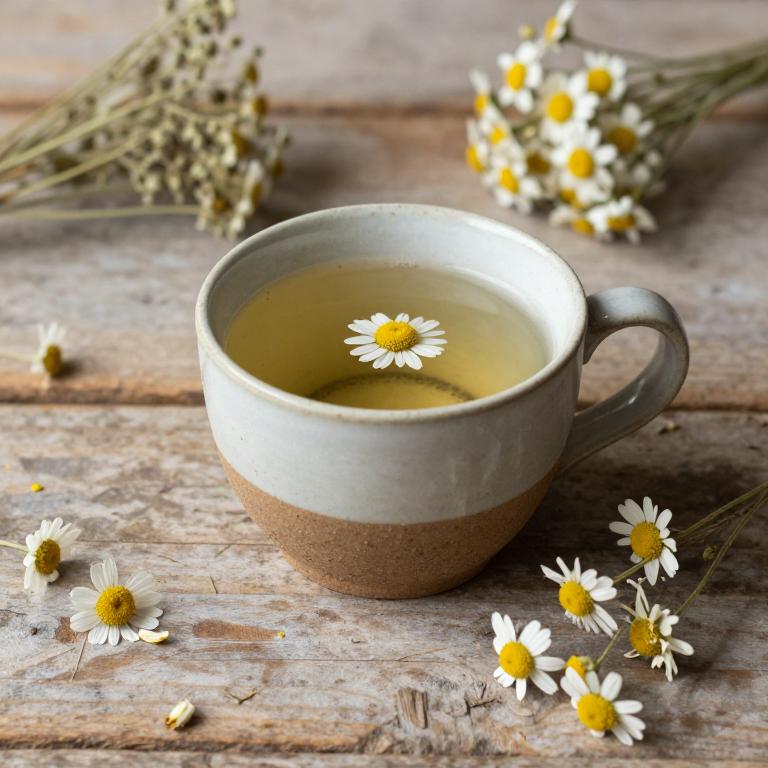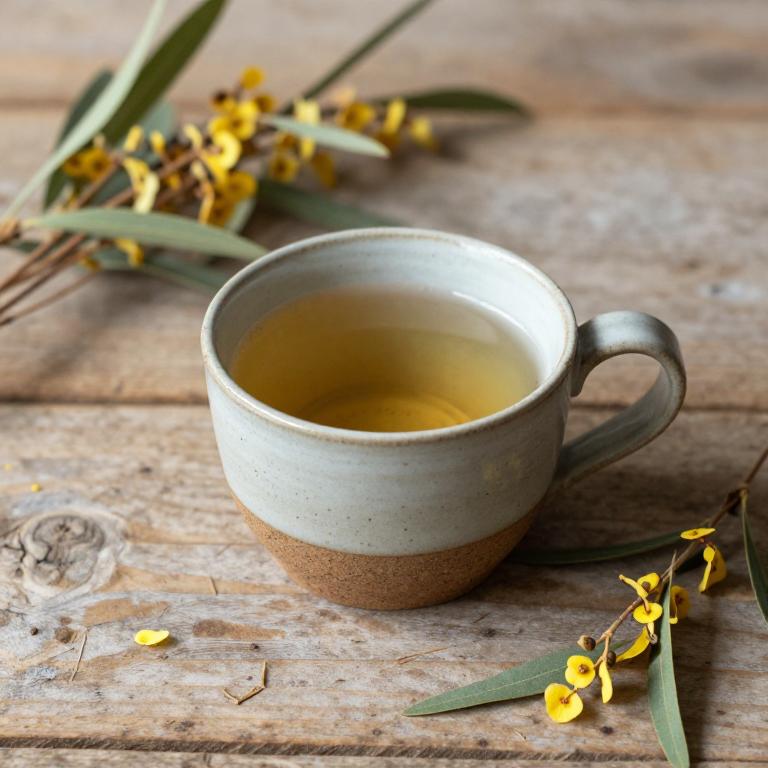10 Best Herbal Teas For Itchy Scalp

Herbal teas can be a natural and effective remedy for an itchy scalp, offering soothing and anti-inflammatory properties that help calm irritation.
Common herbs used in scalp treatments include chamomile, green tea, and lavender, all of which have been shown to reduce itchiness and promote scalp health. To use herbal tea for an itchy scalp, brew a strong infusion and let it cool before applying it to the scalp with a cotton ball or using it as a rinse. Regular application may help alleviate symptoms and improve overall scalp condition.
However, it is advisable to patch test new herbal treatments to avoid any allergic reactions.
Table of Contents
- 1. St. john's wort (Hypericum perforatum)
- 2. Camellia (Camellia sinensis)
- 3. Stinging nettle (Urtica dioica)
- 4. Field horsetail (Equisetum arvense)
- 5. Rosemary (Rosmarinus officinalis)
- 6. Salvia (Salvia officinalis)
- 7. English lavender (Lavandula angustifolia)
- 8. German chamomile (Chamomilla recutita)
- 9. Melaleuca (Melaleuca alternifolia)
- 10. Yarrow (Achillea millefolium)
1. St. john's wort (Hypericum perforatum)

Hypericum perforatum, commonly known as St. John's Wort, is a herbal remedy that has been traditionally used for its potential anti-inflammatory and soothing properties.
When brewed into a tea, it may help alleviate symptoms of an itchy scalp by reducing irritation and promoting skin health. The active compounds in hypericum perforatum, such as hypericin and flavonoids, are believed to have antimicrobial and antiviral effects that can combat scalp infections. However, it is important to consult a healthcare professional before using this herb, as it may interact with certain medications.
Overall, hypericum perforatum herbal tea can be a natural option for those seeking relief from an itchy scalp, though its effectiveness may vary among individuals.
2. Camellia (Camellia sinensis)

Camellia sinensis, the plant from which green and black teas are derived, contains compounds like catechins and polyphenols that have anti-inflammatory and antimicrobial properties, making it a potential natural remedy for itchy scalp.
These compounds can help reduce scalp irritation and fungal growth, which are common causes of itchiness. Herbal teas made from Camellia sinensis can be applied topically as a rinse or used internally to support overall scalp health. Regular use may help soothe inflammation and promote a healthier scalp environment.
However, it is advisable to consult a healthcare professional before using any herbal remedy, especially if the itching persists or is accompanied by other symptoms.
3. Stinging nettle (Urtica dioica)

Urtica dioica, commonly known as stinging nettle, is a herbal remedy that has been used for centuries to address various health issues, including scalp irritation.
When brewed into a tea, stinging nettle can help soothe an itchy scalp due to its anti-inflammatory and antihistamine properties. The tea is believed to reduce excess sebum production and alleviate skin irritation, making it a natural alternative for those with dandruff or eczema. To prepare the tea, fresh or dried nettle leaves are steeped in hot water for several minutes.
Regular use of urtica dioica herbal tea may provide relief from persistent scalp itchiness, though it is advisable to consult a healthcare professional before incorporating it into a skincare routine.
4. Field horsetail (Equisetum arvense)

Equisetum arvense, commonly known as horsetail, is a traditional herbal remedy often used in herbal teas to address an itchy scalp.
This plant is rich in silica, which supports skin health and may help strengthen hair follicles. When brewed into a tea, horsetail can provide a soothing effect on the scalp, potentially reducing irritation and itchiness. However, it is important to note that horsetail contains compounds that can be toxic if consumed in large amounts, so it should be used with caution and in recommended quantities.
As with any herbal remedy, it is advisable to consult a healthcare professional before incorporating horsetail tea into a skincare or hair care routine.
5. Rosemary (Rosmarinus officinalis)

Rosmarinus officinalis, commonly known as rosemary, is a fragrant herb that has been traditionally used for its soothing and therapeutic properties.
Rosemary herbal teas can be particularly beneficial for individuals experiencing an itchy scalp, as they contain compounds that may help reduce inflammation and promote scalp health. The essential oils in rosemary, such as camphor and cineole, are believed to stimulate blood circulation and alleviate dandruff-related itchiness. When brewed as a tea, rosemary can be applied topically to the scalp or consumed internally to support overall wellness.
Regular use of rosemary herbal tea may help soothe irritation and provide a natural remedy for persistent scalp discomfort.
6. Salvia (Salvia officinalis)

Salvia officinalis, commonly known as sage, has been traditionally used in herbal teas to address various health concerns, including scalp issues.
When brewed into a tea, sage contains compounds that may help reduce inflammation and soothe an itchy scalp. Its antifungal and antimicrobial properties can potentially combat scalp infections that contribute to itchiness. To use sage for an itchy scalp, the tea can be cooled and applied as a rinse or used in a compress.
While sage tea may offer relief, it is advisable to consult a healthcare professional before using it for persistent or severe scalp conditions.
7. English lavender (Lavandula angustifolia)

Lavandula angustifolia, commonly known as English lavender, is a popular herb used in herbal teas to address an itchy scalp.
This plant contains compounds like linalool and lavandins, which possess anti-inflammatory and antimicrobial properties that can help soothe scalp irritation. When brewed into a calming tea, lavender can reduce redness and itching by calming the skin’s inflammatory response. To use it for an itchy scalp, the tea can be applied topically as a compress or used in a scalp massage.
Regular use of lavender herbal tea may provide natural relief and promote a healthier scalp environment.
8. German chamomile (Chamomilla recutita)

Chamomilla recutita, commonly known as German chamomile, is a popular herbal remedy used in teas to soothe an itchy scalp.
This plant contains active compounds such as bisabolol and flavonoids, which have anti-inflammatory and antiseptic properties that can help reduce irritation and redness. When brewed into a calming tea, it can be applied topically or rinsed over the scalp to provide relief from dryness and itchiness. Many people find that regular use of chamomile tea can improve scalp health and promote a more comfortable, balanced scalp environment.
However, it is important to ensure that the tea is properly prepared and used in moderation to avoid any potential allergic reactions.
9. Melaleuca (Melaleuca alternifolia)

Melaleuca alternifolia, commonly known as tea tree oil, is a natural ingredient often used in herbal teas to address itchy scalp issues.
Its antimicrobial and anti-inflammatory properties help reduce fungal infections and irritation that can cause itching. When infused into herbal teas, melaleuca alternifolia provides a soothing effect on the scalp, promoting healing and relief. These teas are typically combined with other calming herbs like lavender or chamomile to enhance their therapeutic benefits.
Regular use of melaleuca-based herbal teas can support scalp health and alleviate persistent itching without the use of harsh chemicals.
10. Yarrow (Achillea millefolium)

Achillea millefolium, commonly known as yarrow, has been traditionally used in herbal remedies for its anti-inflammatory and soothing properties.
When brewed into a herbal tea, it may help alleviate an itchy scalp by reducing irritation and promoting scalp health. The tea contains compounds like chamazulene and flavonoids that have antimicrobial and antiseptic effects, which can help combat fungal or bacterial infections that contribute to itchiness. To prepare the tea, steep 1-2 teaspoons of dried yarrow leaves in hot water for 10-15 minutes, then allow it to cool before applying it to the scalp.
While generally safe, some individuals may experience allergic reactions, so a patch test is recommended before regular use.